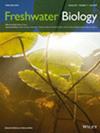Bioclimatic influence on water chemistry and dissolved organic matter in shallow temperate lakes of Andean Patagonia: A gradient approach
IF 2.8
2区 生物学
Q2 ECOLOGY
引用次数: 0
Abstract
生物气候对安第斯巴塔哥尼亚温带浅湖水化学和溶解有机物的影响:梯度方法
我们研究了生物气候变量(降水、温度和植被)对巴塔哥尼亚安第斯山脉北部温带浅湖的物理化学特性、碳(C)和营养物质动态的影响。研究了位于安第斯巴塔哥尼亚生物气候梯度沿线的四个浅水湖泊(平均水深 15 米),其特点是自西向东降水量减少、温度升高、植被类型发生变化。对物理化学变量、总氮和总磷(TN 和 TP)以及颗粒和溶解有机物(POM 和 DOM)进行了分析。通过多变量分析,评估了环境变量对湖水化学的影响,并确定了与湖泊 DOM 池空间和时间差异相关的主要因素。降水量的空间和季节性减少以及气候变暖反映了湖泊水文连通性的降低。连通性降低导致电导率、pH 值、碱度、溶解有机碳 (DOC) 和 TN 浓度升高。这种条件有利于湖泊 DOM 芳香度、腐殖质含量和分子量/大小的损失,并增加了降解信号和生物产生的 DOM 部分。沿安第斯-巴塔哥尼亚梯度,湖泊对气候变量变化的反应是一致的。在梯度尺度上,各湖泊在水化学和溶解氧组成方面的差异与降水量、温度和流域植被的变化有关,这可能有助于深入了解预测气候趋势下的碳和水化学轨迹。我们的研究结果表明,干旱和气候变暖的趋势可能导致水文连通性降低,湖泊的陆地 DOM 通量减少,同时内部降解过程增加。
本文章由计算机程序翻译,如有差异,请以英文原文为准。
求助全文
约1分钟内获得全文
求助全文
来源期刊

Freshwater Biology
生物-海洋与淡水生物学
CiteScore
5.90
自引率
3.70%
发文量
162
审稿时长
2 months
期刊介绍:
Freshwater Biology publishes papers on all aspects of the ecology of inland waters, including rivers and lakes, ground waters, flood plains and other freshwater wetlands. We include studies of micro-organisms, algae, macrophytes, invertebrates, fish and other vertebrates, as well as those concerning whole systems and related physical and chemical aspects of the environment, provided that they have clear biological relevance.
Studies may focus at any level in the ecological hierarchy from physiological ecology and animal behaviour, through population dynamics and evolutionary genetics, to community interactions, biogeography and ecosystem functioning. They may also be at any scale: from microhabitat to landscape, and continental to global. Preference is given to research, whether meta-analytical, experimental, theoretical or descriptive, highlighting causal (ecological) mechanisms from which clearly stated hypotheses are derived. Manuscripts with an experimental or conceptual flavour are particularly welcome, as are those or which integrate laboratory and field work, and studies from less well researched areas of the world. Priority is given to submissions that are likely to interest a wide range of readers.
We encourage submission of papers well grounded in ecological theory that deal with issues related to the conservation and management of inland waters. Papers interpreting fundamental research in a way that makes clear its applied, strategic or socio-economic relevance are also welcome.
Review articles (FRESHWATER BIOLOGY REVIEWS) and discussion papers (OPINION) are also invited: these enable authors to publish high-quality material outside the constraints of standard research papers.
 求助内容:
求助内容: 应助结果提醒方式:
应助结果提醒方式:


